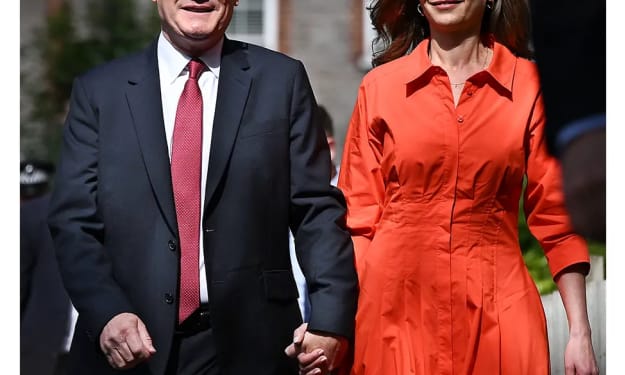A game of "Rules for thee and not for me" pt1
The influence of World powers,I.e the US, on International justice bodies

On June 4th, 2024, the US House of Representatives passed a significant bill, marking a controversial milestone. After nine months of widespread media coverage of alleged war crimes, the US has effectively declared Israel exempt from accountability, sparking intense debate and concern globally.
The "Illegitimate Court Interaction Act" aims to punish the International Criminal Court for pursuing justice in the longstanding Israeli-Palestinian conflict. Critics argue that this move exposes international law as a tool for Western interests, with the US shielding an apartheid regime from accountability. While the effort is widely condemned, it raises a crucial question: if the US can disregard international law and ignore its own war crimes, what value does the law hold? This sparks a necessary conversation about the efficacy and integrity of international law.
In May, the International Criminal Court's (ICC) chief prosecutor sought arrest warrants for Israeli leaders Benjamin Netanyahu and Defense Minister Yav Galant, indicting them for war crimes and crimes against humanity. This move prompted the US to pass the "Illegitimate Court Interaction Act" in June, aimed at sanctioning the ICC for its pursuit of justice in the Israeli-Palestinian conflict.
The Israeli-Palestinian conflict has seen numerous human rights abuses, including the widespread destruction of Gaza, targeted attacks on medical personnel and journalists, and the killing of children by Israeli snipers. The use of white phosphorus, a banned substance, on schools and hospitals has been documented, along with the forced relocation of the population to supposedly safe areas that were subsequently targeted by airstrikes. These atrocities have been well-documented, making the ICC's indictment of Israeli leaders for war crimes and crimes against humanity a long-overdue step towards accountability.
International legal experts have anticipated accountability for Israeli officials' crimes against humanity in the occupied territories. The ICC's move to issue arrest warrants for Israeli leaders is a significant step. However, in an effort to appear impartial, the ICC has also targeted Hamas officials, including Yahya Sinwar and two others. This development is not surprising, as the ICC likely aims to avoid the appearance of bias, particularly given the significant political pressure from the US. Both Israeli and Palestinian officials have objected to the ICC's decision, highlighting the complex and contentious nature of the conflict.
Netanyahu resorts to divisive rhetoric, framing the conflict as "children of light versus children of darkness," a narrative that perpetuates harmful and extremist ideologies. In contrast, the Palestinian resistance condemns the ICC's decision, stating that it "equates the victim with the executioner." International observers largely agree with this assessment, drawing parallels with historical struggles, such as slave revolts and the Warsaw Ghetto Uprising, highlighting the power imbalance and the need for accountability.
US politicians are often accused of dishonesty, but denying Israel's genocide and war crimes takes a special kind of cruelty. The evidence is readily available; a simple search on social media platforms like Twitter or Telegram using the hashtag #Palestine reveals haunting images and testimonies that expose the harsh reality of the conflict. The deliberate denial of these atrocities is a disturbing testament to the power of political spin and the need for continued awareness.
The plight of the Palestinian people is a grave concern that warrants attention and action. Despite the overwhelming evidence, Joe Biden and his administration have chosen to deny the genocide, a decision that will indeed be a dark stain on their legacy. The Rose Garden speech only serves as a stark reminder of the disconnect between political rhetoric and harsh reality. It's crucial that we continue to raise awareness and demand accountability for the atrocities committed. The voices of the oppressed must be heard, and it's our responsibility to amplify them.
Biden's statements on Israel's actions in Palestine are not only false but also perpetuate harmful rhetoric that denies the reality of the situation. His claims that Israel is prioritizing civilian protection and that the situation is not genocide are contradicted by numerous human rights organizations, international law experts, and eyewitness accounts. The fact that a president can make such statements with impunity, while simultaneously supplying weapons that enable these atrocities, reveals a profound disconnect between political discourse and moral accountability. This is a stark reminder of the need for sustained activism and advocacy to hold leaders accountable for their actions and words.
The weaponization of the Holocaust is a troubling trend, where politicians and media outlets exploit the tragedy to deflect criticism of Israel's actions in Palestine. By invoking the Holocaust, they aim to silence dissent and paint Hamas as the sole perpetrator of violence. This rhetoric is not only historically inaccurate but also diminishes the severity of the Holocaust. The NYT's statement is particularly egregious, as it perpetuates a false equivalence between Hamas' actions and the systematic murder of six million Jews during the Holocaust. This kind of language obscures the reality of the Palestinian experience and stifles meaningful discussion about accountability and human rights.
Republican Nikki Haley's comments are alarming, as she not only perpetuates the misleading narrative but also explicitly encourages violence with her "finish them" statement. This kind of rhetoric is reckless and dangerous, especially when directed at a vulnerable population like the Palestinians in Gaza. The bipartisan support for Israel's actions, despite international condemnation, highlights the profound influence of the pro-Israel lobby in US politics. Your conclusion is poignant: the US has the power to effect change, but its refusal to do so enables the continued perpetration of human rights abuses. The crux of the matter indeed.
About the Creator
Enjoyed the story? Support the Creator.
Subscribe for free to receive all their stories in your feed. You could also pledge your support or give them a one-off tip, letting them know you appreciate their work.





Comments
There are no comments for this story
Be the first to respond and start the conversation.